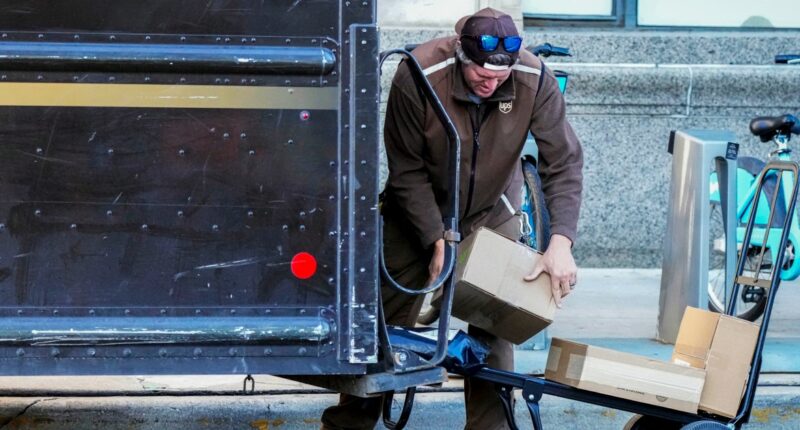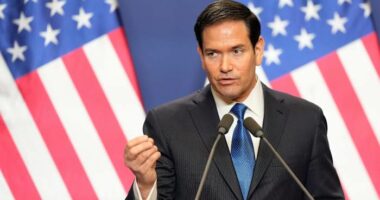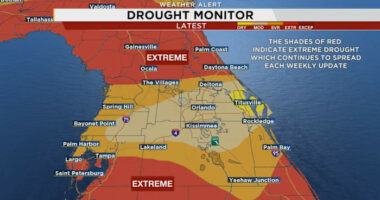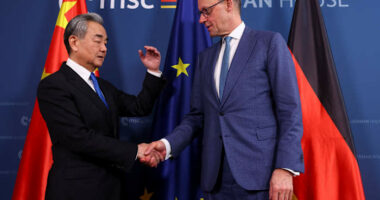Share this @internewscast.com

The bills are sudden and jarring: $1,400 for a computer part from Germany, $620 for an aluminum case from Sweden and $1,041 for handbags from Spain.
Some U.S. consumers have reported unexpected fees from international shipping companies as the exemption on import duties for goods valued under $800 has lapsed due to President Donald Trump’s tariff initiative.
That’s leading to some frustration and confusion as shoppers and shippers both try to navigate a new reality for anybody ordering goods from abroad.
“It’s maximum chaos,” said Nick Baker, co-lead of the trade and customs practice at Kroll, a firm that advises freight carriers.
Thomas Andrews, an entrepreneur from upstate New York specializing in restoring vintage computers from the 1980s and 1990s, was astonished when UPS billed him roughly $1,400 in tariffs for a component valued at $750. He initially thought an error had occurred.
“That’s extortion,” Andrews said.
By Friday evening, a UPS representative informed Andrews that there had indeed been a mistake: the actual tariff should have been about $110. Unfortunately, it was too late because Andrews had declined the delivery to avoid the steep charge. Shortly after learning of the corrected tariff, he discovered that UPS had already commenced the return process to Germany.
The final annoyance, Andrews said: He’s being charged for the return shipping — about $50.
UPS released a statement mentioning that they offer solutions for merchants to manage the new regulations, though they did not comment on individual customer billing concerns.
As of August 29, for the first occasion in almost one hundred years, small-dollar imports to the U.S., also known as de minimis goods, are subject to import tariffs. This includes small, private purchases being affected by the considerable tariffs applied to U.S. trading partners. Although a ruling by the U.S. Court of Appeals for the Federal Circuit deemed many of Trump’s tariffs unconstitutional, they are still in place as Trump continues to challenge the verdict in the Supreme Court.
In response to these de minimis rules, several nations have stopped their shipments to the U.S., leading to an approximately 80% reduction in postal traffic to the country, according to a United Nations agency.
But many orders are still flowing. And since the new de minimis rule began taking effect, social media platforms have been filled with accounts of U.S. customers receiving shock bills from major shippers like DHL, FedEx and UPS, having received no notice about the charges from the foreign merchant they’d ordered from.
The shippers, in turn, are being inundated with messages from customers disputing the charges, along with return-to-sender requests as the customers refuse shipments to avoid having to pay the bills.
A representative for DHL said the firm “is committed to supporting customers through the recent tariff changes and ensuring their shipments are managed efficiently.”
“We encourage customers to take note of the shipping policies of the brands they shop with and to also remember that tariffs are payable to the U.S. government,” it said.
The Trump administration has heralded the billions in revenues the tariffs are bringing in — and in the case of the new de minimis rule, argued the change is essential to halting the flow of small-sized illicit drug packages and drug ingredients. In a statement posted the day the new de minimis rules took effect, U.S. Customs and Border Protection said the logistics industry “has already adapted to the changes with minimal interruption.”
“This change has been months in the making, and we are fully prepared to implement it,” said Susan S. Thomas, acting executive assistant commissioner for CBP’s Office of Trade. “Foreign carriers and postal operators were given clear timelines, detailed guidance, and multiple options to comply. The only thing ending on August 29 is the pathway that has been used by criminals to exploit America’s borders.”
Baker said foreign merchants are obligated to provide information to the shipper about the classification of the item, which is key to the tariff calculation — but from a regulatory perspective, the customer, as the importer of record, is ultimately responsible for the accuracy of that information.
But many people are still getting caught off guard.
After receiving a tariff bill for $620 on a $300 aluminum computer case from Sweden, Robert Wang decided to turn the shipment away.
A software engineer in the San Francisco Bay Area, Wang said he placed his order Aug. 22 with Louqe, a high-end Swedish merchant. More than a week later, he received notice from UPS about the bill.
“Confusion transitioned into a late-night panic,” Wang said, as he frantically researched the situation. Eventually UPS confirmed he’d been charged the 200% tariff Trump has slapped on certain aluminum goods.
Wang said he tried to reach out to Louqe about the charge, but did not hear back. The company did not respond to a request for comment from NBC News.
Baker said many foreign businesses that rely on U.S. customers now face the dilemma of eating the tariff cost — assuming they are properly accounting for it in the first place — or passing it on to their customers, which could scare off business. Many merchants abroad have posted to social media to alert U.S. customers that they are suspending shipments there.
Some U.S. small businesses are also paying a price. A day after receiving a shipment from Spain for handbags he said were worth about $600, Herm Narciso said he and his wife, who run a brick-and-mortar shop in Dunedin, Florida, that resells goods from Europe, got a tariff invoice for $1,041.44 from DHL.
“We can’t understand how it’s possible to assess us with that level of tariffs,” Narciso said.
They said that they plan to file a dispute, but that the response could take two to four weeks. Narciso is worried their shop won’t survive the recent changes if they start getting similar bills going forward.
“This last quarter is probably going to tank us,” Narciso said. “The margins on this type of business are slim to begin with.”
He added: “It just doesn’t feel like the American way to me.”
CORRECTION (Sept. 8, 2025, 9:08 p.m. ET): A previous version of this article misstated the carrier that Thomas Andrews received a tariff bill from. It was UPS, not DHL.











